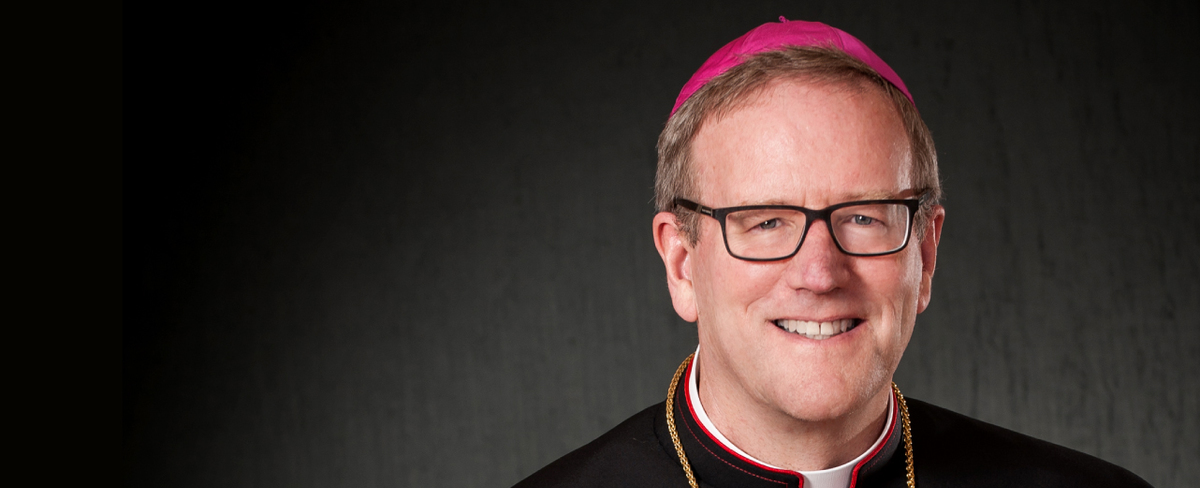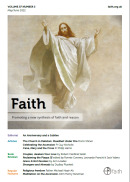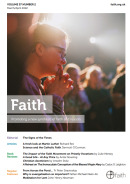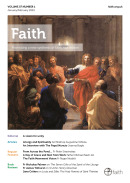Featured
Editorial : THE FUTURE: Evangelising
Editorial:
04.10.18
FAITH magazine is glad to add its voice to the
welcome given to Bishop Robert Barron,
from the USA, to Britain for the 2018 Eucharistic
Congress. Bishop Barron has a strong and welldeserved
reputation as an evangelist – he has taken
seriously the challenge of teaching the Catholic
Faith in new ways across the New Media – DVDs,
twitter, blogs, and websites with glorious images
and music - and in talks and lectures to groups
large and larger.
The Deposit of Faith and the development of doctrine
Article:
04.10.18
There are certain words or terms in the Church’s vocabulary for explaining her beliefs
and practices which I have always found especially enlightening, and perhaps more
than any others, those which I have given as the title of this article; the deposit of faith and
the development of doctrine.
The Word and the Eucharist
Article:
04.10.18
“In the beginning was the Word: and the Word was with God and the Word was God”,
(Jn. 1:1) so begins the beautiful prologue of St. John’s Gospel, a favourite passage
of Fr. Holloway, a passage which places the Incarnation of the Eternal Word within the
context of creation rather than solely redemption. The Word is described as life, the life
that is the light of men, the supernatural life, which God, in His mercy, willed to share with
mankind irrespective of the fall, and which as a result of the fall became incarnate as the
“light which shines in the darkness”. It is a profound text in which St. John, soaring like an
eagle, gazes down from the heights of eternity at the humanity of the Incarnate Word and
the hope, the promise, that those who are made for Him might become one with Him as
co-heirs in His glory.
Interview: Benedict XVI, a new university, and the future
Article:
04.10.18
St Mary’s University has been known to generations of Catholics in Britain as a teachertraining
college. Those who studied here knew it – and know it still – as Simmeries.
Founded in 1850 at Hammersmith, it moved to Strawberry Hill, Twickenham, in the 1920s,
and a visit there on a summer’s day is an agreeable experience: green lawns, pleasant
wooded walks, a sense of history. It adjoins Strawberry Hill House, Horace Walpole’s
gothick folly mansion now run by an independent Trust and open to visitors. The University
itself occupies modern buildings and the site is dominated by an imposing chapel built
after World War II. Pope Benedict came here in 2010 and the Centre that bears his name
was founded following the visit.
Holloway on… John Henry Newman and the Church as Communion in God: Part II
Article:
04.10.18
It is obviously untrue that Newman made his submission to the Church of Rome because
he was a tortured and insecure soul looking for spiritual sanctuary. He was too great in
intellect and in spiritual power for that. He could not, as he prayed in communion with
God, allow the breath of uncertainty and the corrosion of
imperfect human pride to lessen the lustre of Christ, as God
revealed to be followed as Way, Truth and Life. Newman
expressed doubts about the expediency of the definition of
Papal Infallibility by the First Vatican Council. He did accept it
but was always more interested in the seat of the infallibility
of the Church as the word of The Word to the People of God
over the ages.
-
Editorial : THE FUTURE: Evangelising
FAITH magazine is glad to add its voice to thewelcome given to Bishop Robert Barron,from the USA, to Britain for the 2018 EucharisticCongress. Bishop Barron has a strong and welldeservedreputation as an evangelist – he has takenseriously the challenge of teaching the CatholicFaith in new ways across the New Media – DVDs,twitter, blogs, and websites with glorious imagesand music - and in talks and lectures to groupslarge and larger. He has opened up for millions of people the insights of walking in the Holy Land where Christ himself walked, and of visiting some of the great shrines and churches andcathedrals of the world. He has shown the huge beauty of centuries of Christian art andarchitecture and the messages and meanings they convey. And he has patiently and witha pleasant, informative way of communicating, he has opened up the Scripture readingsof the Church’s year Sunday by Sunday, feeding people’s souls and helping many prieststhrough many Sunday homilies to do the same.It was a wise choice as a keynote speaker for what we all hope will be a memorable,indeed landmark event for the Church in Britain.EvangelisationWe need a boost to evangelisation. For too long, it was assumed that people in thiscountry had some basic notion of Christianity, and that Catholics, in particular, had asort of tribal association with the Faith and a loyalty to the idea of Sunday Mass. Peopleused to say “the Faith is caught, not taught” and there was an emphasis in Catholicschools on organising fund-raising events for charity or encouraging forms of service tothe local community, rather than on teaching doctrine or on answering the deep andoften challenging questions raised by the young in a secular society. Even the Eucharistwas often presented as a sort of community meal, with a good neighbourly feeling beingnourished by gathering together.Things have changed in recent – very recent – years. Today’s young priests – andwe don’t have enough of them, as the poor religious formation noted above failed to excite interest in the idea of answering God’s call to service in His vineyard - are fullyaware of the bleak spiritual state of our country. They do not see the Mass as a cheerfulopportunity for neighbourly togetherness, but as the sacrifice of Calvary binding us toeternity. Eucharistic devotion has been revived. Young people gather for Night Feverwith adoration before the Blessed Sacrament in a city church and teams of missionarieswalking the streets with lanterns welcoming people in to light a candle and offer a prayer.Summer gatherings at Walsingham and elsewhere focus on Eucharistic adoration too,with teams of priests hearing confessions.The treasures of the FaithGood preaching, opening up the treasures of the Faith,is central to the Church’s future. We need well-formed,well-instructed priests and teachers. We need torecognise that people do actually want to know aboutthe Church’s teaching: they are often genuinely baffledabout it. And this recognition also needs to include the frightening reality of the woundsthat many people in Western society carry which are in certain specific ways differentfrom the wounds of the past. Where once poverty and hunger stalked the cities of Britain,now it is violent crime and a drug-infested culture, broken families, children introduced topornography and sexual perversions via the internet. Where people were once physicallyhungry, we now have a national problem of obesity. Where once people struggled toobtain a few simple toys for their children today there are households awash with plasticand electronic gifts but where the children are lonely and screen-addicted.PowerfulSaint John Paul called the Church to a New Evangelisation, and showed the way withpowerful missionary journeys and pioneering new events such as World Youth Day.The odd thing is that WYD was essentially an old-fashioned idea: a big rally with preaching.It’s almost 19th century – an emphasis on a great morale-boosting gathering with a strongChristian uplifting message and large-scalecommunal worship. But it began at the end of the20th century when most commentators tendedto the view that such events belonged to the past,with Billy Graham’s rallies the last of such things.Then WYD - against expectations – proved hugelypopular, a gigantic and magnificent event that grew from year to year, and St John Paulthe Great had opened the way for something important and new.How to go aheadPeople like to gather for big events – the 2010 Papal Visit also proved this – and theyneed a sense of connection with each other, with the past, and with God. So all plans forthe future for parishes serious about evangelisation might include, wherever possible,summer street processions with the Blessed Sacrament, candlelit processions to agraveyard or cemetery for All Souls’ Day, Christmas carols at railway stations and fromhouse-to-house, and similar activities.There is no slick way to re-convert Britain.This isn’t a matter of trying to imposeChristianity by government diktat. The lightof Christ must permeate the culture, winninghearts and opening up closed minds.There is no quick-fix. People cannot be nagged or bullied into turning to Christ: theymust be helped to find him. The Church has the truth: offering it will mean that many willnot be able to stomach it at first. We will need, as always, to find people’s real spiritualneeds and to offer real assistance.We aren’t alone: we have all of Heaven with us. Saints –those who taught the Faith inthis land before us, and above all those who died as martyrs for doing so – will respondwhen we invoke their prayers.Determination and hopeThe Eucharistic Congress should be a sign of determination and of hope. Those attendingshould return home with a real desire to communicate the glory of Christ. That will nothappen without humility, an understanding of our own inadequacy and a frank admissionthat we have not been doing very well inrecent decades. We are entitled also to arecognition of the hugeness of the task:we face an unfriendly culture which inso many ways presents great challenges.But we have great and glorious truths toimpart and once we have fully absorbedthat fact, we can set about working on ways of fulfilling the task.Beautiful and dignified liturgy: no gimmicks, no silly attempts to intersperse chattyremarks or crass jokes. A new approach to music – it really is time to call a halt to earpoundingfrom electric guitars in church. Lots of Eucharistic adoration, opportunities forconfession, and sound teaching on both these subjects from the Sunday pulpit. Goodteaching for children when they are brought together in First Communion groups.Outdoor processions, especially with the BlessedSacrament. Celebration of feasts and festivals: thedrama of Holy Week and Easter, the joy of feast-daysthat transform an ordinary weekday into somethingmarvellous. Popular devotions with Marian devotionsin May and the Rosary in October, and graves blessedin November. All this, plus outreach with comeand-discover meetings, and street carol-singing atChristmas and lantern-led walks to shrines. All of thatis basic stuff for parish life, and doesn’t involve much more than dedication, love and areal desire to live the Faith to the full.

















